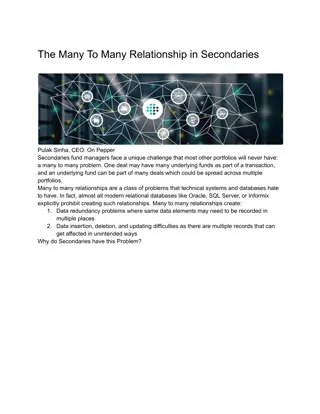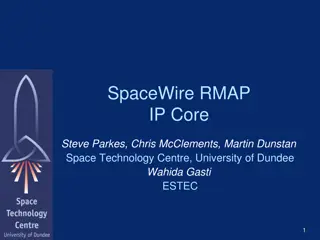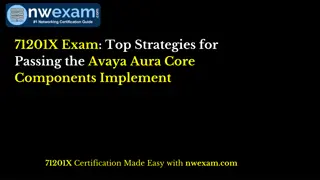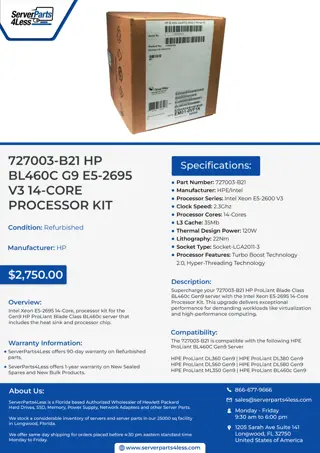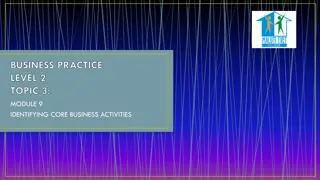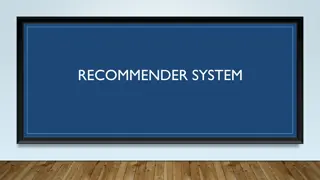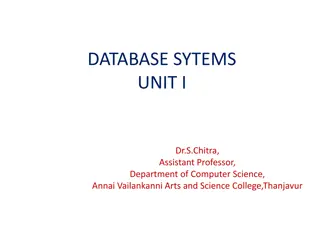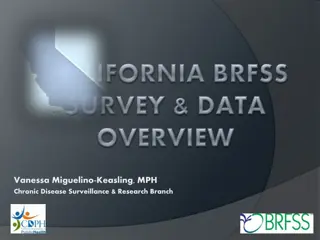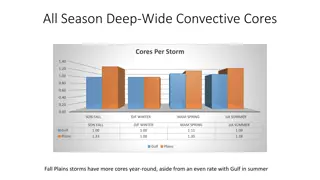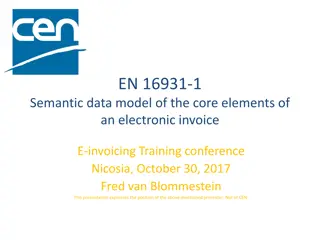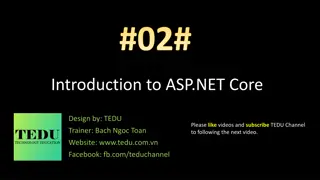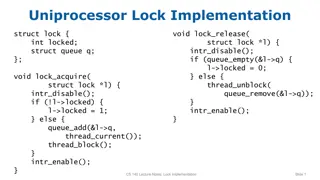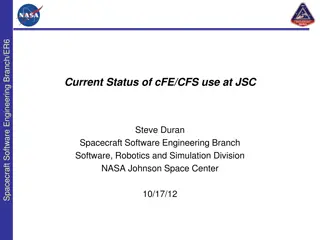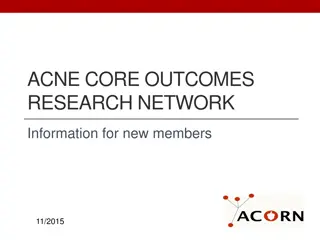Minnesota Core Volleyball Club - Empowering Athletes, Building Community
Discover the newly named Minnesota Core Volleyball Club focusing on core values, quality training, competitive tournaments, and a supportive environment. Join now and unlock your potential on the court!
1 views • 21 slides
Core Forum 2024: Call for Proposals
Core Forum 2024 invites submissions for presentations on key topics such as Access & Equity, Leadership & Management, Preservation, and more. The event aims to gather practitioners to share innovative projects and research. Submit your proposal to be part of this thought-provoking conference in Minn
1 views • 16 slides
Enhance Your Fitness Journey: Core Strength and Speed Workouts
Explore the importance of core strength in maintaining posture and physical performance, engage in a virtual group challenge to test your endurance with wall planks, and boost your core strength with a practical 7-minute workout. Transition into focusing on speed with insights into sprinting, cyclin
0 views • 38 slides
CORE Organic Pleiades Network First Annual Workshop Roadmap 2030 - Event Recap
The CORE Organic Pleiades Network held its first annual workshop in Brussels, focusing on organic research and innovation in the European agri-food sector. The event discussed HEU partnerships, national/regional action plans, research funding, and more. CORE Organic aims to enhance knowledge and inn
0 views • 37 slides
Understanding Terrestrial Planets and Core Dynamics
Exploring the core-mantle interaction from the early Hadean period to present times reveals intriguing questions about the outer core's electrical conductivity, geodynamo sustainability, and inner core characteristics. Studies indicate challenges in maintaining the geodynamo, potential heat sources
9 views • 48 slides
The Many To Many Relationship in Secondaries
Many to many relationships are a class of problems that technical systems and databases hate to have. In fact, almost all modern relational databases like Oracle, SQL Server, or Informix explicitly prohibit creating such relationships.
2 views • 2 slides
Overview of Distributed Systems: Characteristics, Classification, Computation, Communication, and Fault Models
Characterizing Distributed Systems: Multiple autonomous computers with CPUs, memory, storage, and I/O paths, interconnected geographically, shared state, global invariants. Classifying Distributed Systems: Based on synchrony, communication medium, fault models like crash and Byzantine failures. Comp
9 views • 126 slides
Loyola University Maryland Liberal Arts Core Overview
The Liberal Arts Core at Loyola University Maryland emphasizes a well-rounded education through courses in Humanities, Social Sciences, Mathematical Sciences, and Natural Sciences. Students take 15 core courses in liberal arts, including writing, history, literature, language, philosophy, theology,
2 views • 19 slides
Enhancing Common Core Aligned Math Lessons for Los Angeles Students
Plan and implement Common Core aligned problem-based math lessons using John Van de Walle's Three-Phase Structure to prepare Los Angeles students for college and career success. Explore strategies to cater to diverse learners such as English learners, Standard English learners, Students with Disabil
4 views • 23 slides
Understanding Information Systems in Organizational Management
Management in organizations is divided into three levels: operational, tactical, and strategic. Each level requires different information systems to support various activities. Operational systems focus on routine transactions and control processes, while middle-level systems aid in semi-structured
8 views • 39 slides
Core Discipleship: Empowering Believers to Make Disciples
Core Discipleship is a transformative process focused on loving God, making disciples, and equipping believers to fulfill the Great Commission. Through relationships in Christ Jesus, it emphasizes simplicity, Biblical teachings, and reproducibility. Discover the heart of Core Discipleship through ke
0 views • 23 slides
Overview of SpaceWire RMAP IP Core and Applications
This content provides an overview of the SpaceWire RMAP IP Core developed by Steve Parkes, Chris McClements, and Martin Dunstan from the Space Technology Centre at the University of Dundee, along with Wahida Gasti from ESTEC. It discusses the architecture, testing, performance, and current/future wo
4 views • 21 slides
71201X Exam: Top Strategies for Passing the Avaya Aura Core Components Implement
Start Here: \/\/bit.ly\/3yMFf4W\n\nGet all the details you need to pass the 71201X exam and achieve the Avaya Aura Core Components Implement (ACIS-7120) certification. Access comprehensive information, including tutorials, practice tests, books, study materials, exam questions, and the syllabus. Enh
2 views • 17 slides
Best Ladies Night in Downtown Core
It's Ladies Night in Downtown Core, and you are welcome to CAPASSO. It is more than just an Italian Restaurant; it's a vibrant destination in the heart of Singapore's Downtown Core. With its inviting bar, lounge, whisky, and cigar room, CAPASSO offers a sophisticated ambience perfect for both casual
0 views • 6 slides
727003-B21 HP BL460C G9 E5-2695 V3 14-CORE PROCESSOR KIT
Refurbished | HP 727003-B21 | BL460C G9 E5-2695 V3 14-CORE PROCESSOR KIT | \u2713 FREE and FAST Ground Shipping across the U.S. | Best Price Guaranteed\n\n\/\/ \/727003-b21-hp-bl460c-g9-e5-2695-v3-14-core-processor-kit\/
0 views • 1 slides
Insights into Nuclear Core Dynamics and Structure
Exploring the dynamics of nuclear cores, this research delves into the intricacies of probing the NN repulsive core, modern NN potentials, and field theories of nucleons and mesons. The study encompasses the isospin dependence, non-nucleonic components, hidden color, and gluons within the nucleus, s
1 views • 63 slides
Understanding Your GPA: Weighted vs. Unweighted, College Admission, and Scholarships
GPA, or Grade Point Average, plays a crucial role in college admission and scholarship opportunities. Understanding the difference between weighted and unweighted GPAs is essential. Weighted GPAs give more weight to advanced classes like AP and Dual Enrollment, impacting your overall GPA calculation
0 views • 11 slides
Understanding Core Business Activities in a Business Setting
Exploring the concept of core business activities within an organization, this module delves into the significance of identifying and understanding specific activities such as purchasing, production, marketing, and administration. By uncovering the relationships between these core functions, busines
0 views • 14 slides
Understanding Different Types of Recommender Systems
Recommender systems play a crucial role in providing personalized recommendations to users. This article delves into various types of recommender systems including Collaborative Filtering, Content-Based, Knowledge-Based, and Group Recommender Systems. Collaborative Filtering involves making predicti
0 views • 7 slides
Nutrition Cluster Core Functions Overview
The content provides a detailed overview of the core functions of the Nutrition Cluster, focusing on objectives, core functions, group work activities, and explanations on supporting service delivery, informing strategic decision-making, and advocacy. It highlights the importance of cluster coordina
1 views • 19 slides
Introduction to Embedded Systems Design
Embedded Systems Design, Chapter 1 provides an insightful overview of embedded systems, distinguishing them from general-purpose computers. The chapter delves into the characteristics of embedded systems, their design considerations, and the various types of embedded computers such as general-purpos
1 views • 7 slides
Focusing on Student Learning and Success in Higher Education
NWCCU emphasizes the importance of student learning outcomes and core competencies across programs to ensure student success. The institution engages stakeholders to develop meaningful, assessable, and aspirational core competencies relevant to students and communities. Through collaborative efforts
0 views • 9 slides
Understanding Database Systems in IT
Database systems play a crucial role in managing and organizing data efficiently. They provide a structured environment for storing and accessing information, enabling various applications in sectors like banking, airlines, universities, sales, and more. The transition from traditional file systems
3 views • 38 slides
Overview of BRFSS Survey and its Core Components
The Behavioral Risk Factor Surveillance System (BRFSS) is a state-based telephone survey that monitors personal health behaviors in non-institutionalized adults. It collaborates with the CDC and all 50 U.S. states to gather data on various health topics. The survey includes fixed core questions on d
0 views • 18 slides
Overview of CUPE Local 3550's Response to Anti-Union Legislation
A detailed overview of Bill 32, an anti-union legislation affecting Canadian Union of Public Employees (CUPE) Local 3550, which requires categorization of dues into core and non-core, with members opting in for non-core spending. The local has reviewed its budget, confirming it is 100% core, and emp
0 views • 14 slides
Recertification and Assessment of Core Curriculum Courses
The Core Curriculum Council of the Faculty Senate presents a process for recertification and assessment of core curriculum courses to maintain integrity and quality. Courses must be recertified every four years to ensure consistency amidst changes in instructors, content, and teaching methods. State
0 views • 33 slides
Enhancing Alignment Between Introductory Biology and Core Courses
Explore the alignment of the Biology core curriculum, focusing on the structure, goals, and rationale behind flipping portions of the curriculum. Evaluate the preparedness of students for core courses, identify gaps, redundancies, and essential knowledge transfer. Study design involves categorizing
0 views • 25 slides
Analysis of Seasonal Variations in Gulf Plains Convective Cores
The analysis reveals fascinating insights into Gulf Plains convective cores, showcasing variations in core numbers, average pixels per storm, pixels per core, and core sizes across different seasons. Deep-Wide cores dominate in the summer, while Gulf cores are larger in the fall. The study sheds lig
1 views • 4 slides
Achieving Mission Fulfillment Through Core Themes: An Update
In 2016, our college established four core themes to represent its mission at the core. These themes - Academic Transfer, Career & Technical Education, Essential Skills, and Lifelong Learning - serve as indicators to gauge our progress towards fulfilling our mission. Currently, we are performing abo
0 views • 18 slides
Information Systems in Organizations: Overview and Implementation
Information systems play a crucial role in organizations, encompassing transaction processing systems, functional area information systems, and enterprise resource planning systems. This content delves into the purpose of transaction processing systems, the support provided by information systems ac
0 views • 30 slides
Semantic Data Model of Electronic Invoicing Core Elements
Presentation by Fred van Blommestein on the EN16931-1 semantic data model of core elements in electronic invoicing, covering invoice processes, core invoice design, semantic model details, business rules, and invoicing principles. The model includes 160 elements in 33 groups, with mandatory elements
0 views • 13 slides
Efficient Coherence Tracking in Many-core Systems Using Sparse Directories
This research focuses on utilizing tiny, sparse directories for efficient coherence tracking in many-core systems. By optimizing directory entries and leveraging sharing patterns, the proposed approach achieves high performance with minimal on-chip area investment. Results demonstrate significant en
0 views • 66 slides
Understanding ASP.NET Core: Features, Ecosystem, and Differences
ASP.NET Core is a modern framework for building web applications with cross-platform capabilities. It offers a leaner and modular approach compared to ASP.NET Framework. With support for both .NET Core and full .NET Framework, ASP.NET Core enables developers to create applications that can run on Wi
0 views • 9 slides
Lock Implementation Strategies for Single-Core and Multi-Core Systems
The provided content outlines several lock implementation strategies for both single-core and multi-core systems. It covers the structures, functions, and techniques used to manage locks efficiently, including releasing locks, acquiring locks, and handling synchronization. Different versions of lock
0 views • 6 slides
Measurement-based WCET Analysis for Multi-core Architectures
This research focuses on providing an inexpensive multi-core solution for safety-critical systems by utilizing unmodified production chips and measurement-based WCET analysis tools. The goal is to enable WCET analysis on multi-core setups while preserving cost, performance, and time-to-market benefi
0 views • 25 slides
Overview of Spacecraft Software Engineering Branch Activities
The Spacecraft Software Engineering Branch at NASA's Johnson Space Center (JSC) focuses on developing and implementing critical software for spacecraft systems. Their work includes utilizing the core Flight Executive (cFE) and Core Flight System (CFS) for various projects, such as the Morpheus lande
0 views • 10 slides
Understanding Embedded Systems and Cyber-Physical Systems
Embedded systems are specialized computer systems embedded within larger systems, such as control systems and car controllers. This lecture covers real-time aspects, applications of Cyber-Physical Systems (CPS), and examples like the Boeing 777/Airbus A380 cockpit. It discusses the design process of
0 views • 22 slides
Journey to the Earth's Layers
The Earth's structure consists of four main layers: the crust, mantle, outer core, and inner core. The crust is the thin, rocky layer we see on the surface, while the mantle is a solid layer that flows like a viscous liquid. The outer core is a hot, melted layer of iron and nickel, and the inner cor
0 views • 10 slides
Core Review and Alignment Committee Updates
The Core Review and Alignment Committee established in 2021 at WSU is diligently evaluating the existing core requirements, aligning them with learning outcomes, and addressing issues such as student transfers, distinctiveness of the core, and student recruitment and retention efforts.
0 views • 13 slides
ACORN Core Outcomes Research Network Overview
ACORN (ACNE CORE OUTCOMES RESEARCH NETWORK) was established in July 2013 with the aim of creating a standardized set of core outcome measures for use in acne clinical trials. Led by key individuals such as Diane Thiboutot, Jerry Tan, and Alison Layton, ACORN focuses on global representation, stakeho
0 views • 10 slides





